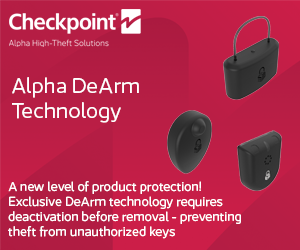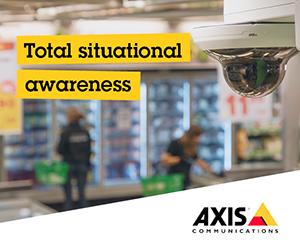COMPANY PROFILE
LP challenges in a "secure" environment
A look inside airport retail and restaurants
By Chris Rathgeb, Senior Director of Loss Prevention and Safety, Paradies Lagardère
EDITOR’S NOTE: This article first appeared in the May−June 2019 edition of LP Magazine US edition.
Paradies Lagardère is the North American division of Lagardère Travel Retail. We have 10,000 associates in more than 850 retail stores and 170 restaurants and bars in 100 airports across North America. Paradies Lagardère delivers the very best solutions—a favourite local concept or a highly desirable international brand—that exceed expectations for our airport partners and travellers.
Paradies Lagardère specialises in three key airport concessions areas: dining, travel essentials, and speciality retail. Within travel essentials and speciality retail, we offer a diverse mix of categories including fashion, luxury, electronics, convenience, sports, luggage, jewellery, and souvenirs. Paradies Lagardère also delivers high-end restaurants, quick-serve and casual restaurants, and quality bars, including local, national, and international brands that provide travellers with delicious dining options.
In the Beginning, There Was Retail
While attending college, I began working for JCPenney in the credit and catalogue department. This was the start of my retail career. While at JCPenney, a store loss prevention officer (LPO) approached the credit and catalogue department team about a credit card fraud case that we might come into contact with and asked us to inform them if the person showed up to retrieve a catalogue order. I ended up being the person who waited on them. I can still remember the feeling when I heard the name and turned around to find the order and realised who I was assisting. It was at that moment—and the moments after as that situation played out with the arrest of the person by law enforcement as they exited the doors of the store—that I thought of loss prevention as a position I would enjoy.
I would have to wait another year before getting the opportunity to transfer schools and begin working at a different JCPenney. At my new store, I discovered they didn’t have any loss prevention presence and enquired with the store manager about the possibility of adding the position. We were nearing the holiday season, so he agreed to place me in the role. I stayed in that store for several months, and during that time I realised catching shoplifters was a lot more difficult than I understood. I ended up transferring back to my original store and met with my first loss prevention teacher, Marcia Rexford. She was the LPO who worked on the credit card fraud case and ignited my passion for loss prevention with her guidance. She was instrumental in helping me understand what to look for in a shoplifter, including behaviour and actions, but it was just scratching the surface on how loss prevention impacts companies.
After four years with JCPenney, I accepted an entry-level LP role with Famous Barr, a division of May Company, and met the manager that had the biggest impact on my development and understanding of loss prevention, Mark Stebbe. He and John Lillard, the vice president of loss prevention, had created a team environment and a culture of learning in which I thrived. I decided during my time at Famous Barr that loss prevention was going to be the career for me.
The Airports Came Calling
After spending some time at Famous Barr, I decided to join a loss prevention programme in the airport concessions industry. That was nearly twenty years ago, and I have never had any doubt that I made the right choice. I worked for HMSHost as they were restarting their loss prevention department. I was given the opportunity to create a programme for a single airport with about thirty different restaurant concepts. Through a promotion to my first regional loss prevention manager role, I was able to expand the programme to a group of airports in the company.
After a year at HMSHost I was approached by the new director of loss prevention at The Paradies Shops. He was tasked with building a loss prevention programme from the ground up and believed I would be a good fit to assist him. It’s not often that you are given an opportunity to create a department’s mission and purpose through ideas you have crafted in your mind on “how I would do it” from its inception. It was too good an offer to pass up.
Fast forward almost nineteen years later, and I am now the senior director of loss prevention/safety and lead a team of thirteen professionals in the areas of loss prevention, safety, general insurance claims management for worker’s compensation, general liability, auto, and property, and lead business continuity for the organisation. In addition, I oversee facilities management for our three support centre offices and supply chain for our retail division.
Some Things Never Change
There are several similarities between airport concessions and conventional retail and restaurants in the LP world. Airport concessions offerings have evolved over time to stay current with popular street retail and restaurants.
Paradies Lagardère’s stores sell high-end electronics such as MacBooks and iPads in our iStores, premium apparel in our Brooks Brothers stores, and high-end handbags and jewellery in our Brighton Collectibles and Pandora stores.
You can also find must-have travel products in our CNBC, Trip Advisor, and locally themed travel-essential stores.
We have losses that include outright theft from registers, failing to record sales, taking merchandise, fraudulent refunds, moving items across multiple checks, bartering in exchange for goods, or giving away items or meals, as well as shoplifting. Customers and airport workers have stolen from us. Granted, it isn’t to the degree that you see street side, but it does happen.
We experience credit card fraud, primarily in our retail division. We have had organised retail crime groups buy cheap airline tickets with the sole purpose of defrauding us. Some will simply go through security with their boarding passes, make a number of fraudulent purchases, and exit, never stepping foot on a plane. Others will make multiple stops across the country and make purchases along the way.
One of our core roles is the identification and resolution of internal theft. Our ability to prosecute is based on knowing the jurisdictional guidelines of all the airports we support. In most cases, local law enforcement patrols the concourses. We build relationships with law enforcement as part of our routine. While they vary from state to state and province to province, we must know each jurisdiction’s requirements. Our ability to leverage the criminal justice system is dependent on the relationships we build with law enforcement.
We established a process in the last four or five years where we will meet with local law enforcement prior to interviewing a dishonest associate. This may seem counterintuitive to contact them before you interview, but we recognised that officers are fluent in the law but not necessarily retail or restaurant theft. By taking the time in advance of our interview to explain what is happening, when it’s happening, and how we are handling it internally, it makes the after-interview process much quicker and more successful. It has been well received by our law enforcement partners in the airport.
We experience operational loss such as short shipping, receiving mistakes, and so forth. Stock shortage, because of operational inefficiencies, is a part of any retail landscape including an airport environment. We are challenged with training gaps, employee turnover, and typical receiving mistakes that hamper any retail operation. We have established a corporate committee specifically designed to look at operational loss related to process gaps. This has been a significant cross-functional effort that has yielded favourable results and systemic improvements. We are constantly focused on training and use audits to help gauge compliance.
Some Things Always Change
To help explain our specific challenges, I think it is important to provide a landscape of operating in an airport. As concessionaires, Paradies Lagardère has two customers. We have the customer who comes into our store or restaurant and pays for merchandise or services rendered. We also have a second customer, which is the airport governing body that decides which concessionaires get to do business at a specific location. Both of those customers are equally important to our success. So much so that our mission statement is “to maintain first-class standards that exceed the expectations of the customers and business partners we serve.”
Street retailers often purchase the store site or negotiate a lease for a space. In the airport concessions environment, we are unable to make site purchases. Our business is dependent on a multiyear store lease based on winning a contract through a request for proposal. At the conclusion of the lease, other airport concessionaires may bid on new lease options proposed by the airport governing body. Paradies Lagardère’s retail and restaurant models are always in a state of renewal, and I need to make sure the loss prevention and safety strategies are meeting the needs of this changing environment.
No two airports are the same, and no two restaurant or store layouts are the same either. We fit our stores into the space provided by the airport. Because each restaurant or store has a different layout, we have to adjust to each space. We must customise our camera design and integration, which requires an additional labour investment for each store opening.
We allow a high degree of functionality on our registers for our associates. Our customers are looking for speed of service. They are typically waiting to catch a flight and can’t be held up waiting on a supervisor to approve the transaction of an associate. This allows opportunity for our associates to conduct fraudulent activity in our stores.
Big Airports, Big Challenges
Our stores and restaurants are open 365 days a year. In our largest operations, we have over forty stores and restaurants. These facilities are spread out to presecurity, postsecurity and could be spread over several concourses or terminals. The concourses and terminals, at times, are not physically connected to each other. The opening and closing times of our operations vary within each airport. This can change if we experience airline delays. We are there to provide service to the travelling public, so our hours of operation remain fluid to allow for these changes. All of these factors can make communication with our team members a challenge. Communication has to be filtered through others. It can be difficult to ensure that the original message gets to everyone in the same context. Because of this, we have to be strategic about our messages to the team.
In larger airports, most of our inventory is stored at an off-site warehouse anywhere from five to twenty minutes from the airport. We can’t secure our inventory by locking or sealing the transport truck because the truck must be inspected before it can enter airport space. We have had instances of those trucks making unscheduled stops along their route to the airport to offload product to a waiting vehicle. Once the product arrives at the airport, it can go directly to a store or be placed in on-site stockrooms throughout the airport. In street retail, it is typically contained within four walls. In our environment, it can be spread between an off-site facility, on-site stockrooms, and multiple stores of an airport. This product is moved around between concourses and stores, depending on where it is needed, and we can lose visibility to where that product goes. On the street side, unpaid-for product has no reason to leave the four walls. In our environment, it will leave one lease line and be moved to another lease line with potentially a lot of space between the two.
The Secret to Having No Secrets
Our approach to loss prevention in our retail and dining divisions is transparency. We openly discuss internal theft. We list in our internal employee communication the different ways employees can steal. We do this for multiple reasons. Our thought is that dishonest employees already have that knowledge of how to steal, but our largely honest population may not recognise what they are seeing when another associate commits an act of theft. By providing this information to our associates, we now have 10,000 people understanding how theft in the workplace occurs. When they observe it, they will know how to respond. This also shows the dishonest associate that we’ve seen it before. It’s not new. We want them to know they aren’t the first and won’t be the last. Finally, it shows a level of trust with our employees. The team recognises we are equipping all of our associates with understanding on how to steal. But when you show trust in your employees, amazing things can happen. They feel empowered and more connected to the organisation. This fits with Paradies Lagardère’s core values of TRIFIC—trust, respect, integrity, first class, innovation, and commitment.
To go along with our transparency approach and emphasise the company stance on theft, Paradies Lagardère made the conscious decision to prosecute those who defraud the company. That decision is known throughout the organisation. The financial dividends obtained through our shrink results reinforce this was the right decision. Since making this change five years ago, we have seen a steady decline in our shrink number. With each successive year, we have broken the record set in the previous year for lowest shrink number in company history.
Another important point in how we achieve success is our relationships with our business partners. The entire team recognises the role we play as a support function. The team develops strong relationships with their operations partners, HR partners, and LP/safety team members and works regularly in cross-functional committees to strengthen and create new and existing relationships.
Tapping into the Hub of Knowledge
Since the restaurant industry is so much different than retail, I find it essential to surround myself with experienced restaurant-specific professionals that I can connect with through the Restaurant Loss Prevention and Security Association (RLPSA).
Networking with like-minded professionals is the key to any loss prevention leader’s success. Attending the RLPSA’s annual conference has provided me with not only an unprecedented networking ability but also education and insight from other restaurant loss prevention programmes facing similar challenges. To me, that is invaluable.





